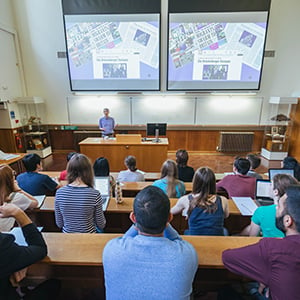
History and Politics
Course overview
UCAS code: LV21
Entrance requirements: AAA
Course duration: 3 years (BA)
Subject requirements
Required subjects: Not applicable
Recommended subjects: History
Helpful subjects: Sociology, Politics, Government and Politics
Other course requirements
Admissions tests: TARA
Written Work: One piece
Admissions statistics*
Interviewed: 41%
Successful: 13%
Intake: 46
Successful for a different course: 4%
Applicant intake for a different course: 16
*3-year average 2023-25
History contact
Tel: +44 (0) 1865 615000
Email: [email protected]
Politics contact
Tel: +44 (0) 1865 278706
Email: [email protected]
Unistats information for this course can be found at the bottom of the page
Please note that there may be no data available if the number of course participants is very small.
About the course
The History and Politics course enables students to study topics in British, European, and World history alongside topics in political analysis. You will divide your time between the History and Politics sides of the degree, developing the basic tools of analysis within each discipline. By drawing these disparate skillsets together, you will learn how to set contemporary political problems in their historical perspective, but also how to deploy political analysis when approaching the study of the past.
From your first year at Oxford, you will have the opportunity to choose from a wide range of options. All first-year students are required to study quantitative methods in preparation for year 2 Social Science papers. You will also study political theory, and your choice of British or European/World history, as well as a specialist period of history or a historical methods paper.
The intellectual rigour of this course benefits from the expertise of Oxford’s political theorists and historians in the history of political thought. It is also strengthened by the thematic approach taken to European and World history teaching in the first year, combined with an emphasis on interdisciplinarity in a number of both Politics and History papers.
Oxford possesses exceptional library provision for both subjects in the Bodleian Library, the History Faculty and Social Sciences libraries, other faculty libraries and the college libraries.
 |  |  |
'I specialised more in Politics than in History. The ‘Introduction to the practice of Politics' paper at Prelims provided me with an excellent foundation for studying specific countries at Finals level. I was able to use the knowledge I obtained here, and apply it within several political contexts - from Japan to South Africa! I especially loved writing my thesis, where I was able to analyse the political challenges of the past with reference to the leading political models of the present.' Stefan | 'I have constructed my course around papers that really interest me, tackling issues ranging from the American War of Independence to the modern-day political culture of the Czech Republic. Both the History and Politics faculties attract leading researchers at the cutting-edge of their fields who work intensively with students, and I have found the intensive engagement with academics one of the most challenging and exciting aspects of life at Oxford.' Nathan | 'The most unexpected thing about my course was the choice! Joint honours courses enable you to have an enormous amount of freedom over what you study - you can choose to specialise or to cover a huge variety of areas. I feel like the independence has helped me to develop in ways I would not have predicted. Studying at Oxford has given me confidence in myself and my ability to think.' Lydia |
Unistats information
Discover Uni course data provides applicants with Unistats statistics about undergraduate life at Oxford for a particular undergraduate course.
Please select 'see course data' to view the full Unistats data for History and Politics.
Please note that there may be no data available if the number of course participants is very small.
Visit the Studying at Oxford section of this page for a more general insight into what studying here is likely to be like.
History and Politics
A typical week
During the first year, you will be expected to attend around five lectures each week, participate in regular meetings with tutors to discuss work, conduct independent research and write at least one essay a week. You will also learn quantitative methods.
In the second and third years you will have the opportunity to choose from an enormous variety of lectures, and your regular tutorials will be supplemented by faculty classes where you will discuss work with a larger number of students.
The third-year thesis will give you the opportunity to engage in a piece of independent research. Generally, students are very much in charge of their own timetable throughout their course.
Tutorials are usually 2-4 students and a tutor. Class sizes may vary depending on the options you choose, but there would usually be no more than around 20 students.
Most tutorials, classes, and lectures are delivered by staff who are tutors in their subject. Many are world-leading experts with years of experience in teaching and research. Some teaching may also be delivered by postgraduate students who are usually studying at doctoral level.
To find out more about how our teaching year is structured, visit our Academic Year page.
Course structure
Year 1
Courses | Assessment |
|---|---|
Four examination papers and a short piece of assessed coursework:
| First University examinations: four written papers The Preliminary Examination must be must be passed for progression to year 2. |
Years 2 and 3
Courses | Assessment |
|---|---|
The course has seven components:
| Final University examinations: either six written papers; one thesis in History or Politics or five written papers; one extended essay; one thesis in History or Politics. |
The content and format of this course may change in some circumstances. Read further information about potential course changes.
Academic requirements
Qualification | Requirements |
|---|---|
A-levels: | AAA |
Advanced Highers: | AA/AAB |
International Baccalaureate (IB): | 38 (including core points) with 666 at HL |
Any other equivalent qualification: | View information on other UK qualifications, and international qualifications. |
Wherever possible, your grades are considered in the context in which they have been achieved.
Read further information on how we use contextual data.
Subject requirements
Recommended: | It is highly recommended for candidates to have History to A-level, Advanced Higher, Higher Level in the IB or any other equivalent. |
|---|---|
Helpful: | Sociology, Politics or Government and Politics can be helpful to students in completing this course, although they are not required for admission. |
If a practical component forms part of any of your science A‐levels used to meet your offer, we expect you to pass it.
If English is not your first language you may also need to meet our English language requirements.
Applying
All candidates must follow the application procedure as shown on our Applying to Oxford pages.
The following information gives specific details for students applying for this course.
Admissions test
| Test | TARA |
| Test date(s) | Test dates will be announced in April 2026. Oxford applicants must book a test for the October sitting. |
All candidates must take the TARA as part of their application.
All the information you need to arrange to take your test as well as how best to prepare can be found on the UAT-UK website.
Written work
Description: | All candidates for History courses are required to send in an argument-driven essay on a historical topic, written as part of their normal school or college work. Please do not send work that requires the assessor to read any source material; avoid source analyses or commentaries. The essay should be a maximum of 2000 words. Extracts from longer essays or pieces of project work are permissible, but should be selected so that they can stand alone and show the candidate's ability to make an argument. Please do remember to include the question which the essay is seeking to answer. If these requirements cause any problems, please contact the Tutor for Admissions at your college of preference. Note that in selecting work for submission you should choose a piece which has enthused you and on which you are willing to talk. Do not worry if you have changed your mind on the topic since writing it. Tutors are impressed by candidates who remain intellectually engaged with their work. Written work must be accompanied by a signed certificate (confirmed by the school or college) stating the circumstances under which the work was written. |
|---|---|
Deadline: | 10 November 2026 |
Visit our further guidance on the submission of written work for more information, and to download a cover sheet.
What are tutors looking for?
Tutors are looking for intellectual curiosity, as well as a flexible approach to engaging with unfamiliar concepts or arguments and an enthusiasm for history and politics.
If you are shortlisted, you may be asked to discuss your submitted written work and personal statement during interview. Candidates may also be asked to read and talk about a short passage as part of the interview.
Find out more about the selection criteria for this course.
Careers
While some History and Politics graduates go on to further study and research to become professional historians and social scientists, others move into different areas.
Recent graduates have started their careers in:
- accountancy
- advertising
- archive work
- finance
- the Civil Service
- consultancy
- international charity work
- the media
- the law
- librarianship
- management consultancy
- museums
- politics
- publishing
- research
- social work
- teaching
- the theatre.
Graduates include a PhD researcher in political science, a senior account executive in public relations and a civil servant.
We don't want anyone who has the academic ability to get a place to study here to be held back by their financial circumstances. To meet that aim, Oxford offers one of the most generous financial support packages available for UK students and this may be supplemented by support from your college.
Fees
Please note that for full-time Home undergraduate students, current university policy is to charge fees at the level of the cap set by the government, which for 2026/27 is £9,790. For details of annual increases, please see our guidance on likely increases to fees and charges. In the 2027/28 academic year course fees for Home fee status students will rise to £10,050 (in line with the government fee cap).
Fee status | Annual Course fees |
| Home | £9,790 |
| Overseas | £43,600 |
Further details about fee status eligibility can be found on the fee status webpage.
For more information please refer to our course fees page. Fees will usually increase annually. For details, please see our guidance on likely increases to fees and charges.
Living costs
Living costs at Oxford might be less than you’d expect, as our world-class resources and college provision can help keep costs down.
Living costs for the academic year starting in 2026 are estimated to be between £1,405 and £2,105 for each month you are in Oxford. Our academic year is made up of three eight-week terms, so you would not usually need to be in Oxford for much more than six months of the year but may wish to budget over a nine-month period to ensure you also have sufficient funds during the holidays to meet essential costs. For further details please visit our living costs webpage.
Financial support
Home | A tuition fee loan is available from the UK government to cover course fees in full for Home (UK, Irish nationals and other eligible students with UK citizens' rights - see below*) students undertaking their first undergraduate degree**, so you don’t need to pay your course fees up front. In 2026 Oxford is offering one of the most generous bursary packages of any UK university to Home students with a family income of around £50,000 or less, with additional opportunities available to UK students from households with incomes of £32,500 or less. The UK government also provides living costs support to Home students from the UK and those with settled status who meet the residence requirements. *For courses starting on or after 1 August 2021, the UK government has confirmed that EU, other EEA, and Swiss Nationals will be eligible for student finance from the UK government if they have UK citizens’ rights (i.e. if they have pre-settled or settled status, or if they are an Irish citizen covered by the Common Travel Area arrangement). The support you can access from the government will depend on your residency status. |
Islands | Islands students are entitled to different support to that of students from the rest of the UK. Please refer the links below for information on the support to you available from your funding agency: |
Overseas | Please refer to the "Other Scholarships" section of our Oxford Bursaries and Scholarships page. |
**If you have studied at undergraduate level before and completed your course, you will be classed as an Equivalent or Lower Qualification student (ELQ) and won’t be eligible to receive government or Oxford funding
Additional Fees and Charges Information for History and Politics
There are no compulsory costs for this course beyond the fees shown above and your living costs.
Contextual information
Unistats course data from Discover Uni provides applicants with statistics about a particular undergraduate course at Oxford. For a more holistic insight into what studying here is likely to be like, please view the information below and explore our website more widely.
The Oxford tutorial
College tutorials are central to teaching at Oxford. Typically, they take place in your college and are led by your academic tutor(s) who teach as well as do their own research. Students will also receive teaching in a variety of other ways, depending on the course. This will include lectures and classes, and may include laboratory work and fieldwork. However, tutorials offer a level of personalised attention from academic experts unavailable at most universities.
During tutorials (normally lasting an hour), college subject tutors will give you and one or two tutorial partners feedback on prepared work and cover a topic in depth. The other student(s) in your tutorials will typically be doing the same course as you and covering the same topic. Such regular and rigorous academic discussion develops and facilitates learning in a way that isn’t possible through lectures alone. Tutorials also allow for close progress monitoring so tutors can quickly provide additional support if necessary.
Read more about tutorials and an Oxford education
College life
Our colleges are at the heart of Oxford’s reputation as one of the best universities in the world.
- At Oxford, everyone is a member of a college as well as their subject department(s) and the University. Students therefore have both the benefits of belonging to a large, renowned institution and to a small and friendly academic community. Each college or hall is made up of academic and support staff, and students. Colleges provide a safe, supportive environment leaving you free to focus on your studies, enjoy time with friends and make the most of the huge variety of opportunities.
- Each college has a unique character, but generally their facilities are similar. Each one, large or small, will have the following essential facilities:
- Porters’ lodge (a staffed entrance and reception)
- Dining hall
- Lending library (often open 24/7 in term time)
- Student accommodation
- Tutors’ teaching rooms
- Chapel and/or music rooms
- Laundry
- Green spaces
- Common room (known as the JCR).
- All first-year students are offered college accommodation either on the main site of their college or in a nearby college annexe. This means that your neighbours will also be ‘freshers’ and new to life at Oxford. This accommodation is guaranteed, so you don’t need to worry about finding somewhere to live after accepting a place here, all of this is organised for you before you arrive.
- All colleges offer at least one further year of accommodation and some offer it for the entire duration of your degree. You may choose to take up the option to live in your college for the whole of your time at Oxford, or you might decide to arrange your own accommodation after your first year – perhaps because you want to live with friends from other colleges.
- While college academic tutors primarily support your academic development, you can also ask their advice on other things. Lots of other college staff including welfare officers help students settle in and are available to offer guidance on practical or health matters. Current students also actively support students in earlier years, sometimes as part of a college ‘family’ or as peer supporters trained by the University’s Counselling Service.
Connect with us
Outreach programmes and events
Many academic departments and faculties at Oxford have dedicated outreach events and activities aimed at promoting their subject area(s) and supporting talented students from all backgrounds to apply to their courses.
University-wide events and resources
In addition to exploring department-run activities, we recommend checking out the outreach event calendar for upcoming University-wide events and other subject and college activities.
Subject-specific resources supporting supercurricular engagement for all ages can also be found via the University's Digital Resource Hub, suggested subject resources webpage and Oxplore, our online learning platform for 11-to-18-year-olds.
UK state school students interested in this or similar courses may like to explore UNIQ, Oxford's free flagship outreach programme for students in their first year of further education. UNIQ offers a choice of academic residentials in over 30 courses and each year provides around 1,500 students with the opportunity to experience Oxford's teaching, explore student life and receive expert support with their application to university.
Prospective applicants can sign up to receive step-by-step support with their Oxford application.
Read more about Oxford's widening access initiatives and other ways to connect with us before applying.

